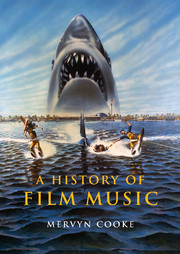Book contents
- Frontmatter
- Contents
- List of illustrations
- Preface and acknowledgements
- 1 The ‘silent’ cinema
- 2 Sound on track
- 3 Hollywood's Golden Age: narrative cinema and the classical film score
- 4 Stage and screen
- 5 The mainstream divides: post-war horizons in Hollywood
- 6 ‘Never let it be mediocre’: film music in the United Kingdom
- 7 Defectors to television
- 8 Film music in France
- 9 Global highlights
- 10 Popular music in the cinema
- 11 Classical music in the cinema
- 12 State of the art: film music since the New Hollywood
- Bibliography
- Index of film titles
- General index
8 - Film music in France
Published online by Cambridge University Press: 05 February 2015
- Frontmatter
- Contents
- List of illustrations
- Preface and acknowledgements
- 1 The ‘silent’ cinema
- 2 Sound on track
- 3 Hollywood's Golden Age: narrative cinema and the classical film score
- 4 Stage and screen
- 5 The mainstream divides: post-war horizons in Hollywood
- 6 ‘Never let it be mediocre’: film music in the United Kingdom
- 7 Defectors to television
- 8 Film music in France
- 9 Global highlights
- 10 Popular music in the cinema
- 11 Classical music in the cinema
- 12 State of the art: film music since the New Hollywood
- Bibliography
- Index of film titles
- General index
Summary
After its theatricality in the early silent era, French cinema was overhauled by the thinking of the influential theorist Louis Delluc, who became the figurehead of the first avant-garde school of directors including L'Herbier and Gance (the music for whose silent films was examined in Chapter 1). Experiments with elements of symbolism and impressionism on the part of these and other directors meant that Henri Langlois could aptly describe Jean Epstein's La Chute de la maison Usher (1928) as ‘the cinematic equivalent of Debussy’ (quoted in D. Cook 2004, 305). At the same time, the emerging surrealism of film-makers such as Germaine Dulac was destined to remain a seminal feature of much later French cinema. Delluc's foundation of ciné-clubs (the antecedents of modern arts cinemas) and promotion of lively intellectual debate on film ultimately led to its widespread acceptance in France as a valid art form. The foundation in 1936 of the Cinémathèque Française as a centre for the study and appreciation of this ‘seventh art’ symbolized the intellectual respectability that the medium had acquired. Surrealist tendencies were intensified by the work of the second avant-garde school, represented by the Dada-inspired films of directors Luis Buñuel and René Clair. (Clair's Entr'acte (1924) is discussed in Chapter 1; on the provocative use of classical music in Buñuel's L'Age d'or (1930), see Chapter 11.)
- Type
- Chapter
- Information
- A History of Film Music , pp. 309 - 341Publisher: Cambridge University PressPrint publication year: 2008



